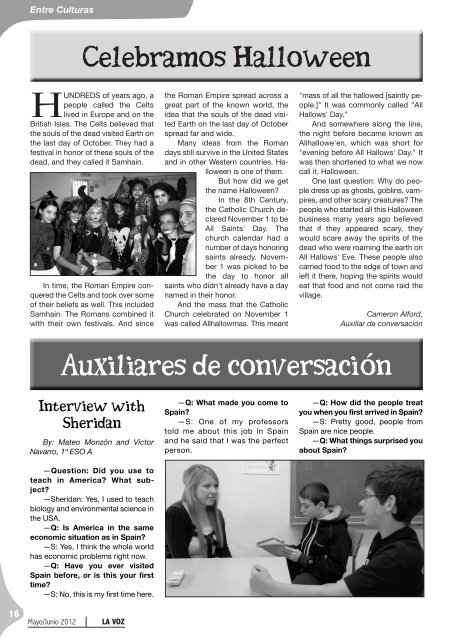La voz de la Estrella nº 2
Revista digital del instituto de enseñanza secundaria La Estrella
Revista digital del instituto de enseñanza secundaria La Estrella
You also want an ePaper? Increase the reach of your titles
YUMPU automatically turns print PDFs into web optimized ePapers that Google loves.
Entre Culturas<br />
HUNDREDS of years ago, a<br />
people called the Celts<br />
lived in Europe and on the<br />
British Isles. The Celts believed that<br />
the souls of the <strong>de</strong>ad visited Earth on<br />
the <strong>la</strong>st day of October. They had a<br />
festival in honor of these souls of the<br />
<strong>de</strong>ad, and they called it Samhain.<br />
In time, the Roman Empire conquered<br />
the Celts and took over some<br />
of their beliefs as well. This inclu<strong>de</strong>d<br />
Samhain. The Romans combined it<br />
with their own festivals. And since<br />
16 Mayo/Junio 2012 LA VOZ<br />
Celebramos Halloween<br />
Interview with<br />
Sheridan<br />
By: Mateo Monzón and Víctor<br />
Navarro, 1º ESO A<br />
—Question: Did you use to<br />
teach in America? What subject?<br />
—Sheridan: Yes, I used to teach<br />
biology and environmental science in<br />
the USA.<br />
—Q: Is America in the same<br />
economic situation as in Spain?<br />
—S: Yes, I think the whole world<br />
has economic problems right now.<br />
—Q: Have you ever visited<br />
Spain before, or is this your first<br />
time?<br />
—S: No, this is my first time here.<br />
the Roman Empire spread across a<br />
great part of the known world, the<br />
i<strong>de</strong>a that the souls of the <strong>de</strong>ad visited<br />
Earth on the <strong>la</strong>st day of October<br />
spread far and wi<strong>de</strong>.<br />
Many i<strong>de</strong>as from the Roman<br />
days still survive in the United States<br />
and in other Western countries. Halloween<br />
is one of them.<br />
But how did we get<br />
the name Halloween?<br />
In the 8th Century,<br />
the Catholic Church <strong>de</strong>c<strong>la</strong>red<br />
November 1 to be<br />
All Saints' Day. The<br />
church calendar had a<br />
number of days honoring<br />
saints already. November<br />
1 was picked to be<br />
the day to honor all<br />
saints who didn't already have a day<br />
named in their honor.<br />
And the mass that the Catholic<br />
Church celebrated on November 1<br />
was called Allhallowmas. This meant<br />
—Q: What ma<strong>de</strong> you come to<br />
Spain?<br />
—S: One of my professors<br />
told me about this job in Spain<br />
and he said that I was the perfect<br />
person.<br />
"mass of all the hallowed [saintly people.]"<br />
It was commonly called "All<br />
Hallows' Day."<br />
And somewhere along the line,<br />
the night before became known as<br />
Allhallowe'en, which was short for<br />
"evening before All Hallows' Day." It<br />
was then shortened to what we now<br />
call it, Halloween.<br />
One <strong>la</strong>st question: Why do people<br />
dress up as ghosts, goblins, vampires,<br />
and other scary creatures? The<br />
people who started all this Halloween<br />
business many years ago believed<br />
that if they appeared scary, they<br />
would scare away the spirits of the<br />
<strong>de</strong>ad who were roaming the earth on<br />
All Hallows' Eve. These people also<br />
carried food to the edge of town and<br />
left it there, hoping the spirits would<br />
eat that food and not come raid the<br />
vil<strong>la</strong>ge.<br />
Cameron Alford,<br />
Auxiliar <strong>de</strong> conversación<br />
Auxiliares <strong>de</strong> conversaci åon<br />
—Q: How did the people treat<br />
you when you first arrived in Spain?<br />
—S: Pretty good, people from<br />
Spain are nice people.<br />
—Q: What things surprised you<br />
about Spain?


